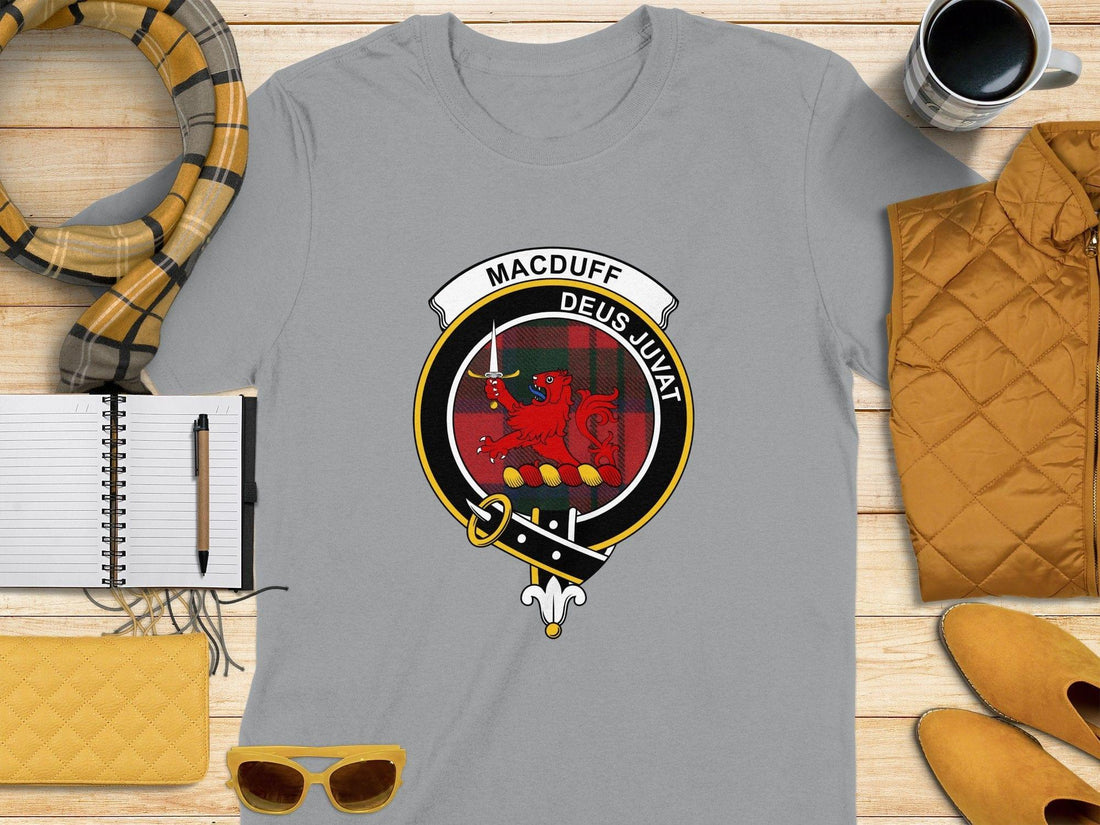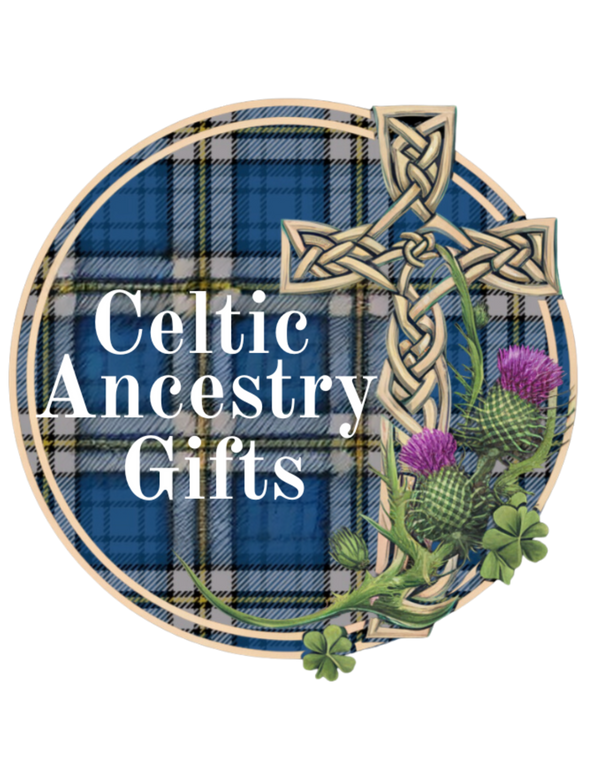
Clan MacDuff — The Ancient Thanes of Fife and Guardians of Scotland’s Crown
Share
1️⃣ Introduction
Long before the great Highland clans rose to power, before the Stuart kings reigned and the Jacobite banners flew, there was Clan MacDuff — a name older than Scotland itself. The MacDuffs were the original Earls of Fife, holders of ancient royal privilege and defenders of Scotland’s earliest kings.
Their lineage reaches deep into the mists of the 11th century, bound to the sacred soil of Fife, where kings were crowned and kingdoms were defended. Revered as a royal and noble line, the MacDuffs stood at the crossroads of myth and history — immortalized in both the chronicles of kings and the timeless words of Shakespeare.
To carry the name MacDuff is to carry a title of ancient honour, one that speaks of bravery, justice, and unbroken loyalty to the Scottish crown.
2️⃣ History & Origins
The Pictish and Celtic Beginnings
The name MacDuff derives from the Gaelic Mac Dhuibh, meaning “son of Dubh” — Dubh being a personal name meaning “dark” or “black.” In early Celtic naming traditions, such descriptors often referred to hair colour, strength, or mysterious power.
But for Clan MacDuff, the meaning carries far deeper resonance. Their progenitor, Dubh, was a noble of royal Pictish descent — a man whose descendants would rise to become the most powerful family in medieval Scotland.
The MacDuffs emerged as the chief family of the ancient kingdom of Fife, their power so great that they were recognized as the premier clan of Scotland. In medieval law, the MacDuff line held privileges unmatched by any other — a sign of their near-royal status.
The Privileges of the MacDuffs
The Laws of Clan MacDuff, enshrined in early medieval custom, gave them rights and honours beyond ordinary clans. Among these privileges were:
-
The right to crown the Kings of Scots — a sacred duty performed at Scone, the ancient coronation site.
-
The right to lead the vanguard of the Scottish army in battle.
-
The right of sanctuary for any criminal who reached the Cross of MacDuff at Abernethy, a place of clemency granted by the crown.
These traditions made the MacDuffs the hereditary Guardians of the Scottish Crown, linking their fate to the kingdom’s itself.
MacDuff and King Macbeth
The MacDuff name enters popular legend through Macbeth, both in history and in literature. The historical MacDuff, Mormaer (Earl) of Fife, opposed the tyrannical rule of King Macbeth in the 11th century and supported Malcolm Canmore (later Malcolm III) in reclaiming the throne.
When Macbeth fell in 1057, the new king rewarded MacDuff with titles, lands, and hereditary privileges. This act forever linked the MacDuff line to the rightful kings of Scotland.
It is from this moment that the clan’s motto — Deus juvat (“God assists”) — takes on its enduring meaning: divine favour in the service of justice and the Scottish crown.
3️⃣ Spelling Variations & Related Names
The name MacDuff has been recorded in many forms over the centuries, reflecting the shift from Gaelic to Scots and English orthography. Common spellings include:
-
MacDuff
-
McDuff
-
M’Duff (archaic form)
-
MacDhuibh (original Gaelic form)
-
Duff
-
Duffs (anglicized variant)
While Duff and MacDuff are often related, the former sometimes developed independently in other regions as an occupational or descriptive surname meaning “the dark one.”
The Gaelic Clann Mhic Dhuibh refers to all descendants of Dubh — a reminder that even as the name spread, its roots remained proudly Celtic.
Associated or allied families historically connected to Clan MacDuff include:
-
Clan Wemyss, who shared kinship and territory in Fife.
-
Clan Abernethy, bound by early church and noble alliances.
-
Clan Duff, later established in Banffshire, claiming descent from the same ancient line.
4️⃣ Landmarks & Regions Associated with Clan MacDuff
Fife — The Ancient Heartland
The kingdom and later county of Fife is the spiritual and historical home of Clan MacDuff. Here, their influence was unrivalled for centuries. Their seat stood at MacDuff’s Castle, near East Wemyss on the coast — its ruins still gazing out over the Firth of Forth, whispering of an age when the clan ruled as guardians of kings.
Nearby lies Abernethy, where the MacDuff Cross once stood — a tall stone marking the place of sanctuary granted by law. Any fugitive reaching that sacred site could claim the protection of the clan and the mercy of their name.
Scone — The Crown of Kings
Just beyond Fife, at Scone Abbey, the ancient kings of Scots were crowned upon the Stone of Destiny. It was the Thanes of Fife — the MacDuffs — who performed the coronation rites, an honour granted by custom and sanctified by faith.
In this sacred duty, the clan’s place in Scotland’s royal story was forever sealed.
Banffshire and the Northern Branches
By the later Middle Ages, branches of the MacDuff family spread northward, especially into Banffshire, where the Duffs of Braco rose to prominence. These northern Duffs would eventually be ennobled as the Earls and later Dukes of Fife, continuing the royal connection by marriage to the British royal family in the 19th century.
Thus, the legacy of the ancient MacDuffs of Fife extended even into modern royalty — a rare continuity of noble bloodline through the ages.
5️⃣ Migration & Modern-Day Presence
The MacDuffs and the Wars of Independence
During the Wars of Scottish Independence, the MacDuffs were early supporters of Robert the Bruce. However, internal divisions within the family saw some align temporarily with the English crown — a reminder that even the mightiest clans were not immune to the complexities of loyalty and survival.
Despite these divisions, the MacDuff name continued to command respect. Their hereditary status as the premier clan of Scotland was never forgotten, and they remained powerful landholders in Fife and beyond.
The Diaspora and Emigration
Like many Scottish families, members of Clan MacDuff later emigrated across the world. In the 18th and 19th centuries, MacDuffs could be found in Canada, Australia, the United States, and New Zealand, often as merchants, ship captains, and engineers — professions that reflected their intelligence and enterprise.
One branch gave its name to the coastal town of Macduff in Aberdeenshire, originally known as Doune, renamed in honour of the clan in the 18th century.
Clan MacDuff Today
Though the direct line of the ancient Earls of Fife became extinct, the Clan Duff, descended from them, continues the lineage. The Duke of Fife is recognized as a descendant of the MacDuff line and as a custodian of its noble heritage.
Clan MacDuff societies around the world keep the memory alive, celebrating the clan’s historic privileges, its connection to Scottish kingship, and its motto — Deus juvat — as a symbol of faith and fortitude.
Wherever the name is found today, it still commands respect, carrying with it the echoes of Scotland’s earliest nobility.
6️⃣ Fun Fact
The MacDuffs are the only clan in Scottish history to have been granted their own personal laws — the famed “Law of Clan MacDuff.” This ancient code, recognized by medieval kings, allowed the clan unique privileges in matters of justice and royal ceremony.
Their influence is also immortalized in Shakespeare’s Macbeth, where “Macduff, Thane of Fife” becomes the hero who restores order to Scotland by defeating the usurper king. Though the play is fiction, it preserves the spirit of the real MacDuffs — brave, honourable, and true to Scotland’s rightful crown.
💚 Search your family name in the search bar above to explore your clan gifts. We offer surname gifts on multiple products like mugs, t-shirts, blankets, ornaments, wall art, phone cases, magnets, flags, and more.

